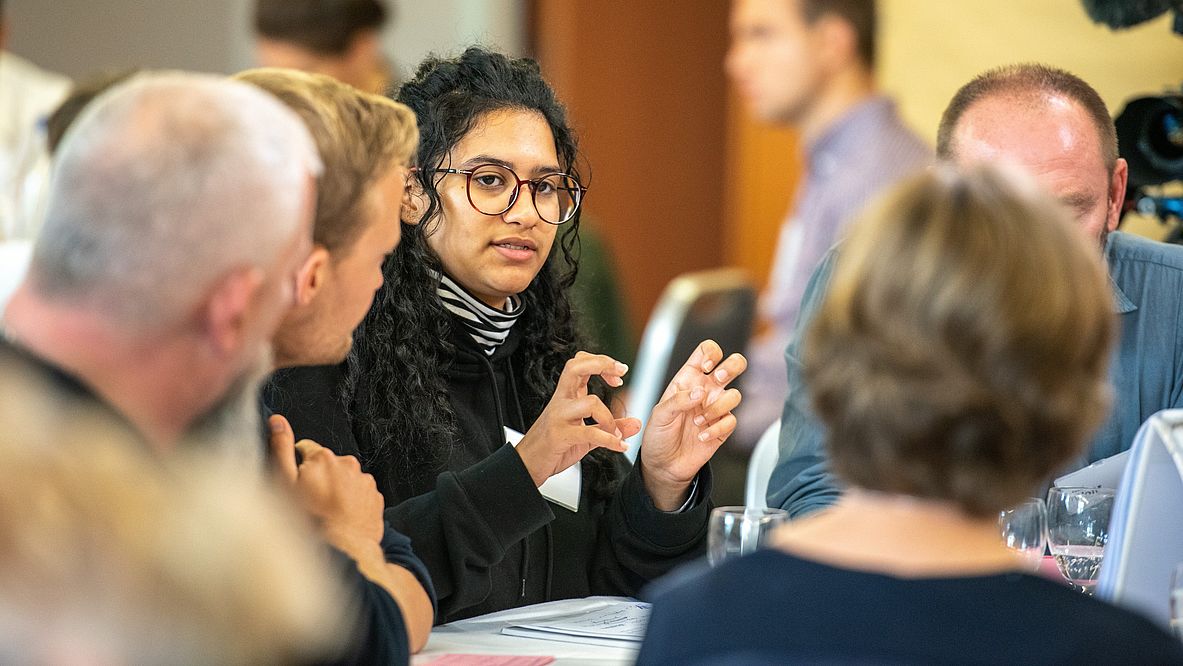Citizens' assembly on nutrition decided

On 10 May 2023, the members of the German Bundestag approved the establishment of the first Citizens' Assembly mandated by Parliament. The topic "Nutrition in Transition: Between Private Concerns and State Responsibilities". 403 MPs voted in favour, 251 against, 12 abstained.
The Citizens' Assembly is to focus on the upheavals in nutrition that are already taking place in everyday life and to bring the citizens' perspective into the political debate. Special attention should be paid to the role of the state in the area of tension between individual freedom and responsibility for society. The first meeting will be held on 29 September 2023.
Added value for the Bundestag
The added value of the Citizens' Assembly for the Bundestag is to get a precise picture of what measures citizens want for a healthier and more sustainable diet or what contribution they themselves are willing to make to this end.
The following concrete guiding questions are to form the framework of the Citizens' Assembly's deliberations:
- What do citizens expect from the state in terms of nutrition policy? Where should it become active and where not? What should the state enable or facilitate?
- What do consumers want to know about their food and its origin? What is included in transparent labelling of social conditions, environmental and climate compatibility and animal welfare standards? How detailed should such information be so that it is helpful and not confusing?
- What do citizens think is necessary for the development of a well-founded knowledge in society as a whole about the connections between nutrition and health? What is the role of schools, for example? What measures should be taken to protect particularly vulnerable consumers?
- How can citizens be better supported in their purchasing decisions with regard to healthy nutrition?
- What fiscal framework should the state set for the pricing of food?
- How can food waste be stopped and what can the state do about it?
These questions tie in with a number of instruments of nutrition policy, such as voluntary commitments, legal minimum standards, regulations, promotional measures, labelling obligations, quality labels or information campaigns and educational measures. The focus should be on measures that the German Bundestag can influence at the federal level.
The Citizens' Assembly is to discuss the suitability and appropriateness of these instruments with regard to the private consumption of certain foods, their production and the food offered in canteens or other community facilities.
160 assembly members
The Citizens' Assembly, which was drawn on 21 July 2023, will consist of 160 people selected at random from all people over the age of 16 with their primary residence in Germany. The random selection followed a multi-stage procedure. The aim was to achieve a balanced participation with regard to the criteria of age, gender, regional origin, municipality size and educational background. In addition, the proportion of vegetarians or vegans in the population is reflected in the assembly. Participants receive an expense allowance of 100 euros per meeting day in presence and 50 euros per online meeting.
The deliberations of the Citizens' Assembly are led by neutral facilitators who ensure a balanced participation of the participants. The assembly is supported by experts from academia and practice in order to convey the necessary knowledge and provide well-founded professional guidance. The aim is to provide as comprehensive and objective an overview as possible of the status and breadth of the discussion on the respective issue. Individual positions are presented and classified as such.
Scientific Advisory Board
A Scientific Advisory Board was formed for the Citizens' Assembly. The Board consists of eleven scientists from recognised universities and research institutions. They were nominated by all parliamentary groups via the Citizens' Assembly Rapporteur Group of the Bundestag Council of Elders.
The Scientific Advisory Board advises the service provider on the composition of the pool of experts and on the design of the procedure. Representatives of the relevant associations and institutions from the business community and civil society are invited to an open hearing before the deliberations of the Citizens' Assembly begin. The subject of the hearing is the implementation of the question proposed by the implementers, the procedural design and the composition of the expert group.
Implementers commissioned
Already on 31 March 2023, the Bundestag administration had announced who it had commissioned to conduct the Citizens' Assembly. Together with the participation companies nexus, ifok and Institut für Partizipatives Gestalten (IPG), the professional association Mehr Demokratie will prepare and accompany the first citizens' assembly commissioned by the Bundestag. This involves both the support of the participants and the organisation and moderation of the entire procedure, as well as the support of the public relations work of the Bundestag.
The Citizens' Assembly submits its recommendations for action to the Bundestag by 29 February 2024 in the form of a citizens' report. A debate on the report will take place in the plenary of the Bundestag as a first deliberation.
It is intended to refer the report to the Committee on Food and Agriculture as the lead committee. The Committees on the Environment, Nature Conservation, Nuclear Safety and Consumer Protection, on Health, on Labour and Social Affairs, on Family Affairs, Senior Citizens, Women and Youth, on the Interior and Home Affairs, on Climate Protection and Energy, on Culture and Media, on Economic Cooperation and Development, and on Housing, Urban Development, Building and Local Government will be involved in an advisory capacity. Other committees may be involved if necessary..
Citizens' assemblies on nutrition in other countries
Other countries also have citizens' assemblies on nutrition. In Switzerland, the "Citizens' Assembly on Food Policy" presented its 126 recommendations for a more sustainable food policy on 7 November 2022. In Sweden, a citizens' assembly ran from April to June 2023 on what needs to change for everyone to eat healthily, sustainably for the planet and affordably for all.
Read more: